Spotlight
Articles And Features
Mike Matessino Interview - From
Poltergeist to Alien
November 2007
Jerry Goldsmith fans should be
familiar with Mike Matessino's name by now as key contributor to a number of
ground breaking soundtrack and DVD releases. Here Mike was kind enough to
talk to Jerry Goldsmith Online about his work on the various Jerry Goldsmith
projects he has produced including the recent two disc restoration of Jerry
Goldsmith's classic score to Alien.
How did
you become interested in film music? And how did you get into working on film
music restorations for CD and DVD?
My
interest in film music came from my parents, who probably purchased more
soundtracks than average people even though they weren’t “collectors.” So I
think because they paid attention to the music in films, so did I. I was
chorister and learned to read music at a very young age and I had an uncannily
tuned ear. My pitch was so perfect that in the days before pitch knobs on LP
turntables I’d get very frustrated because I could tell that the pitch was often
too fast. I became so interested in film that I really didn’t focus on music
enough to pursue composing. From the beginning it seemed that my interest was
more in how the music related to the film and the techniques involved in
editing, mixing, and so on. At university I really wanted to learn about music
editing, but they didn’t teach it. So I basically minored in music and then
applied film editing instruction to music and found that I really liked the
process. Unfortunately, when I was in school they taught everything you needed
to know about filmmaking in the late 80s, which turned out to have nothing
whatsoever to do with what would be going on in the 90s. But by then there was a
growing interest in restoration and in mining studio vaults to get scores from
every era onto compact disc. So my unique circumstances seem to have led me in
that direction. Although I’ve been involved in documentaries and film
restoration, for the past few years I’ve really focused on the music and have
really enjoyed it. I have occasionally dabbled in arranging and have also
directed children’s choirs and have done some teaching, but I love working with
film music on a daily basis.
Which Jerry Goldsmith scores first impressed you?
One of the first “R” rated movies I got to see was The Omen, and the
music scared the (insert biological term) out of me. The same year came
Logan’s Run, which also made an impression and I can remember seeing
Planet of the Apes on the 4:30 movie in New York around the same time. His
scores were very direct and prominent. I basically followed Goldsmith’s projects
consistently after that.
What was working on expanding the score to Poltergeist
like? Also getting to work with Nick Redman and of course Jerry Goldsmith!
 Nick
really facilitated my gradual shift into score restoration. Poltergeist
was a great project because it is one of my favorites. I think it’s a perfectly
scored movie and the entire work is a good listen. But...Jerry had very strong
opinions about expanding scores. He involved himself in his album presentations,
including the original Poltergeist, but he, naturally, came at it from a
different perspective than the listener or score aficionado. When Star Trek:
The Motion Picture was expanded he was approached and insisted that several
cues be cut, including all of the alternates. So it’s a fine line to support the
composer but also your own desires as well as what the fans want, and sometimes
it’s best to not involve the composers. Most are too busy to pay attention to
what happens with their catalog albums anyway, but if you deliberately put it
onto their radar you run the risk of having them dictate what happens with them
even though legally there is no obligation to do so. Nick
really facilitated my gradual shift into score restoration. Poltergeist
was a great project because it is one of my favorites. I think it’s a perfectly
scored movie and the entire work is a good listen. But...Jerry had very strong
opinions about expanding scores. He involved himself in his album presentations,
including the original Poltergeist, but he, naturally, came at it from a
different perspective than the listener or score aficionado. When Star Trek:
The Motion Picture was expanded he was approached and insisted that several
cues be cut, including all of the alternates. So it’s a fine line to support the
composer but also your own desires as well as what the fans want, and sometimes
it’s best to not involve the composers. Most are too busy to pay attention to
what happens with their catalog albums anyway, but if you deliberately put it
onto their radar you run the risk of having them dictate what happens with them
even though legally there is no obligation to do so.
When was your first meeting with Jerry Goldsmith and of course what was it like?
It was in the summer of 2000 when I first met him and he was not the gruff,
dismissive guy I was expecting at all. He was very warm, funny, welcoming, and
truly appreciative of someone who could discuss his work on a musicological
level. I cherished every moment I got to spend with him during a period of about
a year and a half.
Fans are often fascinated by the process and difficulties involved in
releasing soundtracks, could you talk about the process involved and the
problems faced by producers to get a CD released of a score, or DVD produced
with an isolated score?
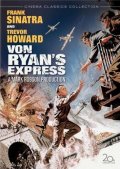 A
big question! Sometimes it’s like walking through a mine field. Do the elements
exist? If so, are they in decent shape or can they be made so? There are issues
of licensing, publishing royalties, reuse payments, etc. And then, what label
will release it? How much will the restoration and mastering cost? It’s all
quite involved but it’s a much more well-oiled machine now than it was a decade
ago. What has proven to be critical is having one or more persons at a given
studio who is supportive and committed to the whole endeavor. As with everything
at the studios there is an element of bureaucracy involved. It’s hard for fans
to comprehend the idea that sometimes even an obscure title is bouncing around
in development for several months until it shows up as a stunning limited
edition on a label like Varése, Intrada or FSM. A
big question! Sometimes it’s like walking through a mine field. Do the elements
exist? If so, are they in decent shape or can they be made so? There are issues
of licensing, publishing royalties, reuse payments, etc. And then, what label
will release it? How much will the restoration and mastering cost? It’s all
quite involved but it’s a much more well-oiled machine now than it was a decade
ago. What has proven to be critical is having one or more persons at a given
studio who is supportive and committed to the whole endeavor. As with everything
at the studios there is an element of bureaucracy involved. It’s hard for fans
to comprehend the idea that sometimes even an obscure title is bouncing around
in development for several months until it shows up as a stunning limited
edition on a label like Varése, Intrada or FSM.
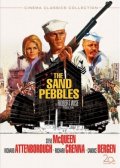 DVD
iso-scores are a completely different arena. With those it is a matter of the
home entertainment divisions seeing the value of the feature and the legal
departments taking the stance that the studio is legitimately able to present
scores in synchronization with the film. The actual work on these can sometimes
be more challenging because it requires the extra step of matching the score to
the picture. The movies are often edited after scoring and the music elements
tend to not synchronize precisely. But it’s just one more way of mining the
vaults and getting more scores out there. I particularly like what Nick has
spearheaded this year with Fox because we’ve been able to keep the slates and
stage chit-chat where we’ve had that. What this does is alert the viewer that
music is about to begin and it becomes a window into the process of spotting a
picture as well as a sense of being on the stage; you can study the film and
contemplate why the artists chose a particular spot to come in with music.
Working on these is gratifying and a learning experience at the same time. It’s
also given us the opportunity to have people like Jon Burlingame and Nick Redman
discuss the world of film scoring in detail on commentary tracks such as those
we have on The Sand Pebbles and Von Ryan’s Express. DVD
iso-scores are a completely different arena. With those it is a matter of the
home entertainment divisions seeing the value of the feature and the legal
departments taking the stance that the studio is legitimately able to present
scores in synchronization with the film. The actual work on these can sometimes
be more challenging because it requires the extra step of matching the score to
the picture. The movies are often edited after scoring and the music elements
tend to not synchronize precisely. But it’s just one more way of mining the
vaults and getting more scores out there. I particularly like what Nick has
spearheaded this year with Fox because we’ve been able to keep the slates and
stage chit-chat where we’ve had that. What this does is alert the viewer that
music is about to begin and it becomes a window into the process of spotting a
picture as well as a sense of being on the stage; you can study the film and
contemplate why the artists chose a particular spot to come in with music.
Working on these is gratifying and a learning experience at the same time. It’s
also given us the opportunity to have people like Jon Burlingame and Nick Redman
discuss the world of film scoring in detail on commentary tracks such as those
we have on The Sand Pebbles and Von Ryan’s Express.
Your work on the Alien DVD was the first time fans could properly
listen to the score in its entirety. What was it like getting this score
included on the DVD? Was there comment or involvement from Ridley Scott for
example?
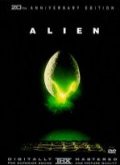 The
Alien 20th anniversary DVD release was done in a huge rush. The green
light came in early January 1999 and everything was delivered in early March. So
we went for as many added features as we could easily put together, and the
music was an obvious choice. Nick Redman supported this because all that existed
at the time was a stereo mixdown of the individual cues with not-so-great sound
quality, and until something better was found it didn’t look like a proper CD
release could ever happen. So he felt it was a way to get the music out there.
When I was in England doing interviews for the documentary and recording Ridley
Scott’s commentary, I went over the music with him to try to figure some of it
out. In many cases it didn’t fit the finished picture but in the end he just
said to include as much of it as possible and to place it where it made sense.
He really wanted it all on there. He loves the score even though he doesn’t
really seem to specifically comprehend just how little of it was actually used
in the film. He also wanted us to get Jerry for the documentary, but at the time
Jerry refused. Five years later he consented for the "Quadrilogy" release, which
they had much more time and money to put together and probably more time to
convince him to do it. The
Alien 20th anniversary DVD release was done in a huge rush. The green
light came in early January 1999 and everything was delivered in early March. So
we went for as many added features as we could easily put together, and the
music was an obvious choice. Nick Redman supported this because all that existed
at the time was a stereo mixdown of the individual cues with not-so-great sound
quality, and until something better was found it didn’t look like a proper CD
release could ever happen. So he felt it was a way to get the music out there.
When I was in England doing interviews for the documentary and recording Ridley
Scott’s commentary, I went over the music with him to try to figure some of it
out. In many cases it didn’t fit the finished picture but in the end he just
said to include as much of it as possible and to place it where it made sense.
He really wanted it all on there. He loves the score even though he doesn’t
really seem to specifically comprehend just how little of it was actually used
in the film. He also wanted us to get Jerry for the documentary, but at the time
Jerry refused. Five years later he consented for the "Quadrilogy" release, which
they had much more time and money to put together and probably more time to
convince him to do it.
The updated "Quadrilogy" set obviously did not have the isolated score, do
you know why this was not carried to that set?
DVD is entirely driven by marketing and it was apparently determined that having
all-new features was the way to go to maximize sales. I think they knew that
whomever wanted the isolated score already had the previous edition and would
hold on to it. But the 20th anniversary version has remained in print and has
appeared in several other editions, including a recent region 1 release in
lenticular packaging. Also, additional audio tracks eat up bit space. I don’t
recall offhand if they added a DTS track or other languages in 2004, but in any
event every audio track you put on there compromises the picture quality a bit
more.
Your next major Jerry Goldsmith project was Star Trek: The Motion Picture.
How important is this score to you? Do you have fond memories of perhaps hearing
that score in the cinema when the movie first came out?
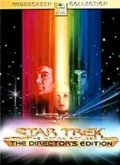 I
would say Star Trek is my favorite Goldsmith score of all-time and
naturally I know it intimately, having had the opportunity to work with the
original elements for The Director’s Edition. I cut school on 7 December
1979 to see it on opening day and I was hooked as soon as the overture played.
That in itself was a treat because the era when overtures were common was over
before I was going to movies. I think it’s an absolute masterpiece. It carried
the entire film and there was not one moment where the music was inappropriate
or where it felt like it was just droning along. To hear that music in a large
theatre was an experience I’ll never forget. We had a screening of The
Director’s Edition just a few months ago and the impact was just as strong
as ever. I
would say Star Trek is my favorite Goldsmith score of all-time and
naturally I know it intimately, having had the opportunity to work with the
original elements for The Director’s Edition. I cut school on 7 December
1979 to see it on opening day and I was hooked as soon as the overture played.
That in itself was a treat because the era when overtures were common was over
before I was going to movies. I think it’s an absolute masterpiece. It carried
the entire film and there was not one moment where the music was inappropriate
or where it felt like it was just droning along. To hear that music in a large
theatre was an experience I’ll never forget. We had a screening of The
Director’s Edition just a few months ago and the impact was just as strong
as ever.
Did you work on the expanded CD or just the special edition DVD for Star
Trek? I’m assuming Jerry Goldsmith was more heavily involved compared to the
previous projects?
I didn’t work on the expanded CD, but Jerry was involved. He was directly
involved with The Director’s Edition DVD and I sought his approval on
every musical change made to the film, he was very supportive and loved the
finished result. He particularly liked the fact that for two of the sequences
being shortened I wanted to cut down the cues first, so that they still made
sense musically, and then edit the picture to the score. “They should cut all
movies like that,” he said. For the CD they did not go back to the original
multi-track first generation reels, but we did, and they are in fantastic shape.
I hope that another project can happen at some point where we get a definitive
and comprehensive release of that score.
Was there any plan to include an isolated score? I was a bit disappointed the
DVD did not have a special doc on the music alone. Would you have liked to see
more discussed about the music on this DVD?
We did propose not only an isolated score, but a series of clips with the
alternate scores mixed into the film, and also having the music isolated on a
parallel track. I’m sure score fans are aware that Paramount’s stance on the use
of music is a bit different than, say, 20th Century Fox, at least for the
moment, so unfortunately we were not able to include that feature. I would have
liked much more of a focus on the music, but our involvement was with the film
itself. Although Robert Wise Productions did the interviews with the filmmakers,
Paramount determined which features would be presented on DVD.
The Fox box set for Varése was a very memorable release for Jerry Goldsmith
fans. Could you talk of your involvement on this project?
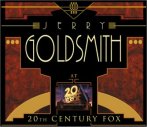 That
was a joy to work on. My responsibility was all of the previously unreleased
music and the idea was to have every score Jerry did at Fox represented. The
challenge, however, was that we have found that at Fox the elements from the
early to mid 1960s are very unpredictable. It may have had something to do with
cheaper stock or the reuse of stock in the aftermath of Cleopatra, when
the studio’s future was in question. So titles like Fate Is the Hunter
and Shock Treatment were not in as good shape as we had hoped. I know
Jerry was thrilled with the overall project when he finally received it, which
sadly was not long before his untimely death. That
was a joy to work on. My responsibility was all of the previously unreleased
music and the idea was to have every score Jerry did at Fox represented. The
challenge, however, was that we have found that at Fox the elements from the
early to mid 1960s are very unpredictable. It may have had something to do with
cheaper stock or the reuse of stock in the aftermath of Cleopatra, when
the studio’s future was in question. So titles like Fate Is the Hunter
and Shock Treatment were not in as good shape as we had hoped. I know
Jerry was thrilled with the overall project when he finally received it, which
sadly was not long before his untimely death.
It was fantastic to see Damnation Alley included on the box set. That score
had been thought lost but turned up in part. Any comments on finding this score
and of course whether the missing electronic parts have been found? Also is
there any news on the often talked about DVD release of the film?
I did what I could with Damnation Alley to include a selection of
cues on the box set. But, as you say, the electronic overdubs are missing. But
in light of what recently happened with Alien, anything is possible. I
haven’t heard anything about the DVD release, but I like this score very much
too and hope something happens with it.
The new two CD presentation of Alien has got fans very excited. I know Nick
Redman has commented before he wanted to do Alien but would not do so until he
found better tapes, compared to the DVD. Plus there was a confusing license
issue involving of all people Universal. Perhaps you can talk generally on how
the project went.
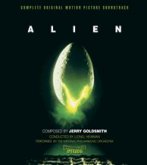 It
was a project that, after years of nothing, just came out of nowhere and came
together lightning fast. As a result of the Amazing Stories albums,
Intrada has developed a good relationship with Universal Music Group, which
inherited the Polygram catalog, which encompasses the old 20th Century Records
label. So the original album master for Alien had to be licensed from UMG
and the rest of the music had to be licensed from Fox. Once the deal was put
together a routine element check miraculously turned up a new 1” source. It’s
possible that it materialized in England when the Director’s Cut was done in
2004. I honestly don’t know. Ron Fuglsby, who investigates and preps all of the
music elements for us at Fox, located it and we had it transferred. It did
require some restoration work, but the result was the remarkable jump in quality
we were always hoping for. I’d guess that Intrada was negotiating the deal long
before I came into it, but from my perspective it went very fast. Nick and Doug
Fake graciously let me run with it due to my previous history with the title and
work with Jerry. I started in July and within two months the work on the music
as well as the liner notes were delivered. For the first time I read Jerry’s own
score with the music playing and it was an absolute revelation. I approached the
entire thing as my tribute to Jerry and I feel it really put a period on my
involvement with Alien. It
was a project that, after years of nothing, just came out of nowhere and came
together lightning fast. As a result of the Amazing Stories albums,
Intrada has developed a good relationship with Universal Music Group, which
inherited the Polygram catalog, which encompasses the old 20th Century Records
label. So the original album master for Alien had to be licensed from UMG
and the rest of the music had to be licensed from Fox. Once the deal was put
together a routine element check miraculously turned up a new 1” source. It’s
possible that it materialized in England when the Director’s Cut was done in
2004. I honestly don’t know. Ron Fuglsby, who investigates and preps all of the
music elements for us at Fox, located it and we had it transferred. It did
require some restoration work, but the result was the remarkable jump in quality
we were always hoping for. I’d guess that Intrada was negotiating the deal long
before I came into it, but from my perspective it went very fast. Nick and Doug
Fake graciously let me run with it due to my previous history with the title and
work with Jerry. I started in July and within two months the work on the music
as well as the liner notes were delivered. For the first time I read Jerry’s own
score with the music playing and it was an absolute revelation. I approached the
entire thing as my tribute to Jerry and I feel it really put a period on my
involvement with Alien.
Judging by the fact this is the second Alien project for you perhaps you can
talk about how much the score means to you? Your feelings on how it was used in
the film and getting to hear it properly for the first time.
It’s really the fourth time I’ve worked on Alien because first came
the laserdisc, then the DVD, then the suite for Varése’s box set, and then the
Intrada edition, plus other things along the way like the Bowl concert in 2001
and consulting on some television specials about the film. I love the Alien
score but I am rather torn when it comes to evaluating what Jerry wrote compared
with how the film ended up. The problem is that I’ve seen the movie so many
times that I can’t look at it objectively any more. My main thought is that the
lack of communication between Ridley and Jerry is what led to such a
polarization between the score as written and the final film. Certainly there
are many moments in the film that play most effectively without music, and
personally I don’t think that Jerry’s romantic approach to the main title and
the over-the-top elements of “The Cupboard” really worked. But they are
fantastic in terms of a purely musical representation of the story on CD. The
use of Freud takes me out of it, but at other times I think the right
choices were made. The use of Hanson at the end works in terms of mood, and a
sense of cleansing, but I believe with one more go Jerry could have achieved the
same thing and still used his own theme. I think I said it best in the CD notes
when I said that “whether each is more effective with or without the other is a
subject for debate as regenerative as the Alien itself.”
I know the DVD allows you to listen to the score isolated against the scenes
it was intended for but I’ve always wanted a DVD release to actually include the
score as intended along with the dialogue and effects. Any thoughts on such a
release?
I don’t really think this is possible. For one thing it would still require
editing because the version Jerry scored was, in key instances, different from
the final version. It would be good to see at least some highlights, though.
You have achieved great things to date but is there any dream Jerry Goldsmith
related projects you would love to do?
I already mentioned a definitive Star Trek: The Motion Picture. In
SA-CD would be great. Overall Jerry’s very well represented on CD and each year
seems to bring a pleasant surprise like The Wind and the Lion and The
Vanishing, which I also worked on. I don't think 2008 will be an exception. For me personally I’d say that the
complete score to Twilight Zone: The Movie currently tops my wish list
along with Damnation Alley.
Thanks, Jason, for the great interview. |